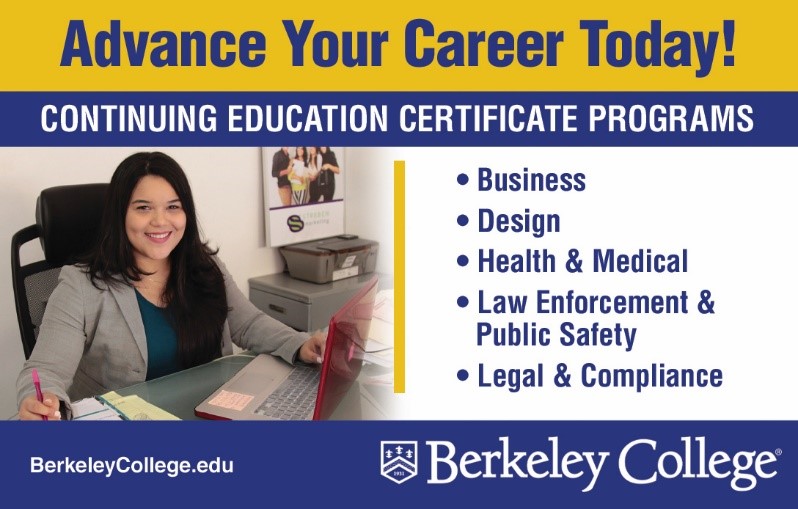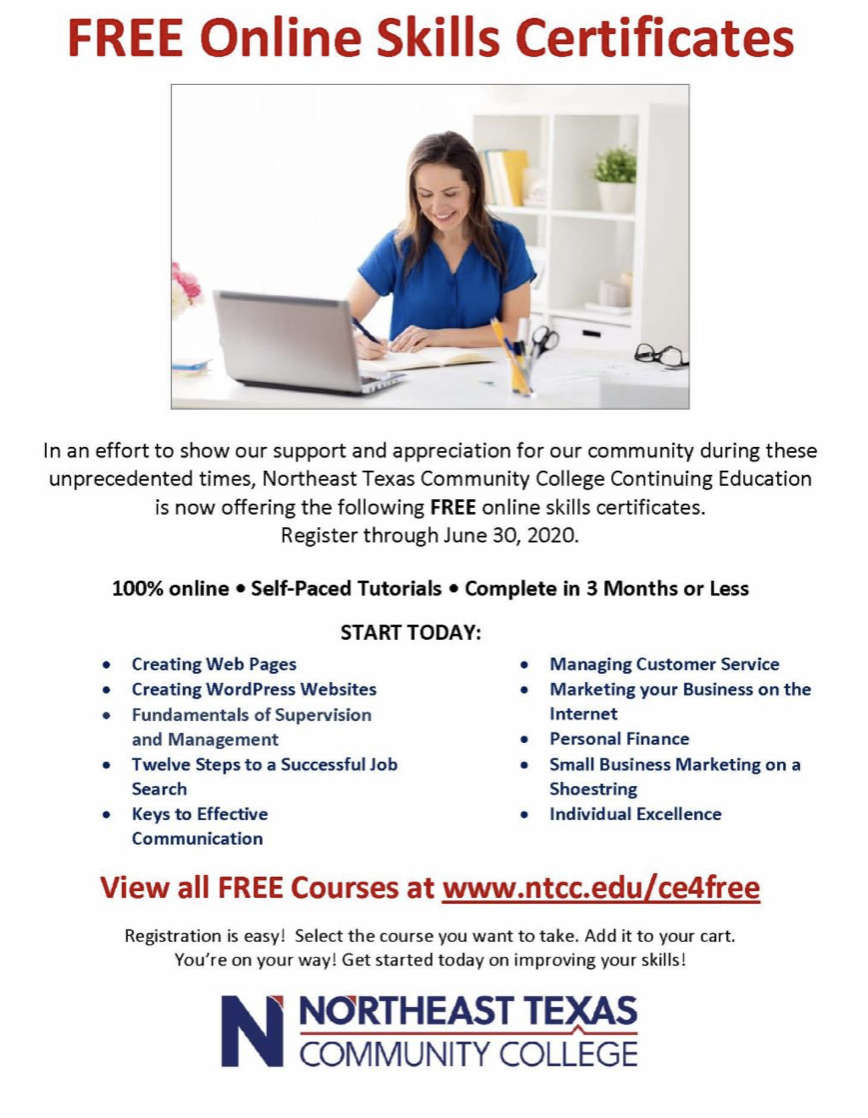Continuing education courses are vital for professional growth. They help you stay updated and competitive.
In today’s fast-paced world, learning never stops. Whether you’re looking to advance your career, switch fields, or simply explore a new interest, continuing education courses offer the perfect opportunity. These courses are designed to fit into your busy schedule, allowing you to learn at your own pace.
They cover a broad range of topics and skills, from technology to business, and from healthcare to the arts. By investing time in continuing education, you not only enhance your knowledge but also boost your confidence. So, let’s dive in and see how continuing education courses can be a game-changer in your professional journey.

Credit: berkeleycollege.edu
Benefits Of Continuing Education
Continuing education courses offer various benefits that cater to both personal and professional growth. These courses are designed to help individuals stay updated with the latest trends, technologies, and skills in their respective fields. Below, we explore some key benefits of continuing education.
Skill Enhancement
One of the primary benefits of continuing education is skill enhancement. By enrolling in these courses, you can:
- Learn new techniques relevant to your field.
- Gain proficiency in emerging technologies.
- Improve existing skills and knowledge.
Enhanced skills make you more competent and efficient at work. This, in turn, can lead to better job performance and satisfaction.
Career Advancement
Continuing education plays a vital role in career advancement. It helps you:
- Qualify for higher positions.
- Increase your earning potential.
- Expand your professional network.
Employers value employees who are committed to learning and growth. This commitment can set you apart from other candidates during promotions or job applications.
| Benefit | Description |
|---|---|
| Skill Enhancement | Improves proficiency in new and existing skills. |
| Career Advancement | Increases job opportunities and earning potential. |
Types Of Continuing Education Courses
Continuing education courses are essential for personal and professional growth. They come in various formats, each serving different purposes. Let’s explore the two main types of continuing education courses: Professional Development and Personal Enrichment.
Professional Development
Professional development courses help you advance in your career. They focus on skills and knowledge related to your job. These courses can make you more valuable to employers. Common professional development courses include:
- Project Management
- Leadership Training
- Technical Skills
- Industry Certifications
These courses often provide certifications. Certifications can improve your job prospects and salary potential. Employers value employees who invest in their own development.
Personal Enrichment
Personal enrichment courses focus on hobbies and interests. They are not necessarily related to your job. These courses help you grow as a person and enjoy life more. Examples of personal enrichment courses include:
- Cooking Classes
- Art and Craft Workshops
- Language Learning
- Fitness and Wellness Programs
Personal enrichment courses can lead to new hobbies. They can also improve your mental well-being. Learning new skills can be fun and rewarding.
Popular Fields For Continuing Education
Continuing education is crucial for career growth. It opens up new opportunities and keeps skills updated. Many fields offer courses that can help you advance. Some fields are more popular than others for continuing education. Let’s explore some of these fields.
Technology And It
The technology and IT sector is rapidly evolving. New technologies emerge every year. Continuing education in this field keeps you up-to-date. It helps you stay competitive in the job market. Some popular courses in this field include:
- Cybersecurity: Protect systems and data from cyber threats.
- Data Science: Analyze large sets of data to gain insights.
- Cloud Computing: Learn to use cloud services like AWS and Azure.
- Programming Languages: Master languages like Python, Java, and C++.
These courses can lead to high-paying jobs. They also offer job security. With the right skills, you can excel in this field.
Healthcare And Wellness
The healthcare and wellness field is always in demand. Professionals in this field help people live healthier lives. Continuing education here is vital. It ensures you provide the best care possible. Popular courses in this field include:
- Nursing: Advanced courses for registered nurses.
- Medical Coding: Learn to code medical records accurately.
- Physical Therapy: Courses for physical therapists to enhance skills.
- Nutrition: Study the science of food and its impact on health.
These courses can improve your career prospects. They also enable you to provide better care. With the right education, you can make a significant impact in people’s lives.
Flexible Learning Options
Continuing education courses offer various flexible learning options. These options cater to diverse needs and lifestyles. Learners can choose from online courses, part-time programs, and more. This flexibility helps balance education with other responsibilities.
Online Courses
Online courses provide a convenient way to learn. Students can access materials anytime, anywhere. This option suits those with busy schedules. It also allows learners to study at their own pace. Online courses often feature interactive content. These include videos, quizzes, and discussion forums. This engagement helps improve understanding and retention.
Part-time Programs
Part-time programs offer another flexible learning option. These programs are ideal for working professionals. They allow students to take fewer courses at a time. This makes it easier to manage both work and study. Part-time programs often have evening or weekend classes. This scheduling helps accommodate various commitments.
Choosing The Right Course
Choosing the right continuing education course can be a daunting task. It is important to find a course that aligns with your career goals. The right course can help you gain valuable skills and knowledge. This can lead to better job opportunities and career advancement. In this section, we will discuss how to choose the right course for you.
Assessing Your Goals
Start by assessing your career goals. What skills do you need? What are your long-term career aspirations? Write down your goals and identify the gaps in your skills or knowledge. This will help you focus on the courses that can bridge these gaps. Knowing your goals will make it easier to choose a course that aligns with your career path.
Researching Course Providers
Once you have identified your goals, research course providers. Look for providers with a good reputation and positive reviews. Check if they are accredited by a recognized authority. Accreditation ensures that the courses meet certain quality standards. Read testimonials from former students to get an idea of their experiences. Compare the costs, duration, and content of different courses. This will help you make an informed decision.

Credit: www.hufriedygroup.com
Funding Your Education
Continuing education courses can open new doors for your career. But sometimes, affording these courses can be a challenge. Luckily, there are several ways to fund your education. Below are some options to consider for easing the financial burden.
Scholarships And Grants
Scholarships and grants are excellent ways to fund your education. Unlike loans, you do not have to pay them back. Here are some key points to consider:
- Merit-based Scholarships: These are awarded based on academic or other achievements.
- Need-based Grants: These are given based on your financial situation.
- Field-specific Grants: Some grants target specific fields like STEM or arts.
- Community Scholarships: Local organizations often offer scholarships to residents.
Applying for scholarships and grants can significantly reduce your education costs. Always check the eligibility criteria before applying.
Employer Assistance
Many companies offer financial support for continuing education. Here’s how you can benefit:
- Tuition Reimbursement: Some employers reimburse tuition fees after course completion.
- Professional Development Funds: Companies may allocate funds for employee development.
- In-house Training Programs: Many firms offer internal training programs that you can attend for free.
Always talk to your HR department about available programs. Knowing your options can help you make informed decisions.
Balancing Work And Study
Managing both work and study can be challenging. But, with the right approach, you can make it work. This section will provide practical tips to help you balance your responsibilities.
Time Management Tips
Time management is key to balancing work and study. Here are some tips:
- Prioritize Tasks: List your tasks by importance. Focus on the most critical tasks first.
- Set Realistic Goals: Break your goals into smaller, manageable tasks.
- Use a Planner: Keep track of deadlines and appointments in a planner.
- Eliminate Distractions: Find a quiet place to study. Turn off notifications on your phone.
- Take Breaks: Short breaks can help you stay focused and refreshed.
Creating A Study Schedule
A study schedule helps you organize your time effectively. Here’s how to create one:
| Day | Study Time | Tasks |
|---|---|---|
| Monday | 7 PM – 9 PM | Review notes, complete assignments |
| Tuesday | 7 PM – 9 PM | Read chapters, prepare for quizzes |
| Wednesday | 7 PM – 9 PM | Group study, practice problems |
| Thursday | 7 PM – 9 PM | Review notes, complete assignments |
| Friday | 7 PM – 9 PM | Read chapters, prepare for quizzes |
| Saturday | 10 AM – 12 PM | Catch up on missed work, review |
| Sunday | Rest day | Relax and recharge |
Stick to your schedule. Adjust it as needed. Consistency is key.
Maximizing Course Benefits
Continuing education courses provide numerous advantages for learners. To truly maximize these benefits, it’s important to focus on specific aspects of the courses. By doing so, you can enhance your learning experience and gain the most from your educational journey.
Networking Opportunities
Networking is a key benefit of continuing education courses. You meet people with similar interests. These connections can lead to new job opportunities. You can also learn from their experiences. Building a strong network is invaluable. It can support your career growth.
Practical Application
Continuing education courses often include practical applications. This helps you apply what you learn in real-world scenarios. Hands-on learning is effective. It reinforces theoretical knowledge. You gain skills that are directly applicable to your job. This makes you more competent in your field.

Credit: www.ntcc.edu
Frequently Asked Questions
What Are Continuing Education Courses?
Continuing education courses are classes designed for adult learners. They help you enhance skills or gain new knowledge. These courses can be taken online or in-person.
Who Can Benefit From Continuing Education?
Professionals looking to advance their careers can benefit. Also, individuals seeking personal development will find these courses valuable. Lifelong learners can also gain from continuing education.
Are Continuing Education Courses Expensive?
Costs vary depending on the institution and course. Some are free, while others require a fee. Scholarships and financial aid are often available.
How Do I Find Continuing Education Courses?
You can find courses through universities, community colleges, and online platforms. Research institutions that specialize in your field of interest. Check reviews and accreditations before enrolling.
Conclusion
Continuing education courses offer valuable skills for career growth. They keep you updated. They boost your confidence and knowledge. Choose the right course for your needs. Invest in yourself. Stay competitive in your field. Learning never stops. It’s a journey.
So, embrace it. Make the most of every opportunity. Continuing education can make a real difference.

